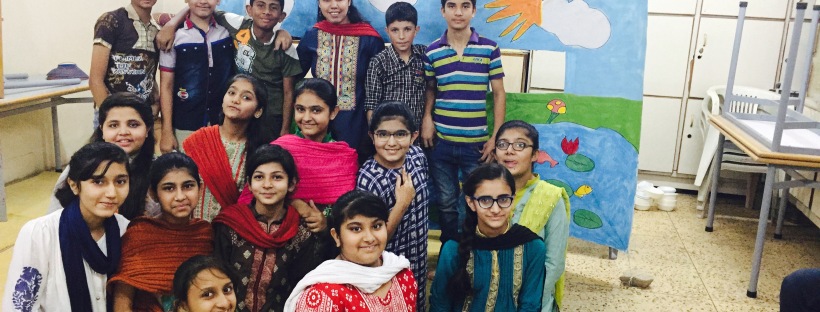Hina Amirali is a Religious Education (RE) teacher based in Karachi, Pakistan where she conducted her research in 2017. Her research was based on her observations in the UK mainstream schools where she observed how teachers’ feedback contributed to the promotion of critical thinking skills in young learners. She was intrigued by this idea and her reflections both as a teacher and a learner enabled her to hypothesise that teacher feedback can play a significant role in promoting the use of critical thinking for children in a RE classroom. Hence, she designed her practice-based enquiry (PBE) for her Masters of Teaching aimed at exploring the role of teacher feedback in promoting the use of critical thinking skills amongst pupils in a RE classroom using an action research framework. The study made use of teacher feedback interventions in various forms including written feedback, verbal feedback, questioning as a feedback tool, project-based feedback, and customized feedback forms over a period of ten weeks. Quantitative and Qualitative data was gathered with the help of questionnaires, focus group discussions, document analysis of students’ work, and teacher-researcher reflective journal.
 In the current age of information technology where facts and interpretations are easily accessible through media and communication to the people of all age groups, it is highly important to equip children with the means to distinguish between facts and interpretations. Given the current state of world dominated by wars, conflict, and stereotypes, young people who are ill-equipped with skills for reasoning, analysing, critiquing, and evaluating the information presented to them, are at a higher risk of developing misunderstandings, stereotypical thinking, and rigidity in their thinking processes. Freire (2004) offers critical thinking as an important skill for children to empower them as free thinkers who reject indoctrination, ask critical questions, respect religious diversity, and act upon rational thinking. Therefore, I believe that the development of critical thinking skills should be a priority to enable our young people to live in a pluralistic world.
In the current age of information technology where facts and interpretations are easily accessible through media and communication to the people of all age groups, it is highly important to equip children with the means to distinguish between facts and interpretations. Given the current state of world dominated by wars, conflict, and stereotypes, young people who are ill-equipped with skills for reasoning, analysing, critiquing, and evaluating the information presented to them, are at a higher risk of developing misunderstandings, stereotypical thinking, and rigidity in their thinking processes. Freire (2004) offers critical thinking as an important skill for children to empower them as free thinkers who reject indoctrination, ask critical questions, respect religious diversity, and act upon rational thinking. Therefore, I believe that the development of critical thinking skills should be a priority to enable our young people to live in a pluralistic world.
Amongst other tools, feedback can be a significant tool employed by teachers to develop students’ critical thinking. My experiences as a student and a teacher in various contexts have led me to believe that feedback helps in moving thinking forward. However, feedback (to be effective) must be perceived by the recipient to be critical, helpful, and meaningful. Based on these observations, I conducted my master’s study using an action-research framework to improve upon my feedback practices as a secondary RE teacher.

Research context:
I undertook my research in a Religious Education Centre (REC) of Ismaili Muslim community in Karachi, Pakistan where I taught in a 7th grade classroom with 16 pupils, aged between 12 and 13. Students at the secondary level in these supplementary schools in Karachi study a specially designed Secondary Curriculum by the Institute of Ismaili Studies (IIS) taught by salaried and professionally qualified teachers worldwide in the Ismaili community. Outside the RECs, the context for many of these learners is a school system where feedback and assessment practices are often outdated and usually follow a transmission-based view of knowledge.
What happened?
 At the outset of the research, data was collected to assess students’ perceptions related to teacher feedback. Much of the data revealed that the feedback given by teachers was generic, non-specific mostly in the form of praise or criticism, or vague in nature. Students also highlighted that feedback was mostly infrequent and usually was associated with assessments in the form of grades and marks lacking any suggestions for improvement. This enabled me to target my feedback interventions accordingly which included written feedback on students’ learning reflections, verbal feedback on students’ classroom performances, written and verbal feedback on students’ project work in groups, provocative or responsive questioning in the classroom, and customized written feedback forms for each student. These feedback interventions were implemented over a period of 10 weeks based on responding to 3 questions for students (1) Where am I going? (2) How am I going? and (3) Where next? Data was collected over the course of 10 weeks through questionnaires, recording the student-teacher and student-student dialogue in the classroom, analysing students’ work, and focus group discussions. The data suggested that students clearly improved in their use of critical thinking skills with the help of the individualized feedback. Pupils acknowledged gains in analytical thinking, reflective thinking, application skills, problem-solving skills, and transfer of learning in their everyday lives. The data also demonstrated that when a teacher makes effective use of a triadic dialogue by extending its dialogic feature and incorporating questioning and repetition as feedback moves, it enhances students’ use of critical thinking by enabling them to generate, elaborate/expand, exemplify, justify, or repair ideas by themselves and their fellow students.
At the outset of the research, data was collected to assess students’ perceptions related to teacher feedback. Much of the data revealed that the feedback given by teachers was generic, non-specific mostly in the form of praise or criticism, or vague in nature. Students also highlighted that feedback was mostly infrequent and usually was associated with assessments in the form of grades and marks lacking any suggestions for improvement. This enabled me to target my feedback interventions accordingly which included written feedback on students’ learning reflections, verbal feedback on students’ classroom performances, written and verbal feedback on students’ project work in groups, provocative or responsive questioning in the classroom, and customized written feedback forms for each student. These feedback interventions were implemented over a period of 10 weeks based on responding to 3 questions for students (1) Where am I going? (2) How am I going? and (3) Where next? Data was collected over the course of 10 weeks through questionnaires, recording the student-teacher and student-student dialogue in the classroom, analysing students’ work, and focus group discussions. The data suggested that students clearly improved in their use of critical thinking skills with the help of the individualized feedback. Pupils acknowledged gains in analytical thinking, reflective thinking, application skills, problem-solving skills, and transfer of learning in their everyday lives. The data also demonstrated that when a teacher makes effective use of a triadic dialogue by extending its dialogic feature and incorporating questioning and repetition as feedback moves, it enhances students’ use of critical thinking by enabling them to generate, elaborate/expand, exemplify, justify, or repair ideas by themselves and their fellow students.
How will I teach differently and why?
The study has been a transformational learning journey for me where my practices of using feedback have developed. I have realized that I need to make the feedback stimulating enough for students to engage with it effectively if it is to promote students’ critical thinking. By making feedback specific, framing it positively, timing it appropriately, and suggesting ways for improvement, I can enhance the quality of my feedback, ensuring students’ active and effective engagement with the given feedback. Moreover, one of the crucial understandings that I have developed as a result of this study is the way in which the student-teacher relationship affects students’ overall learning. Students’ discussions in the focus groups revealed that their emotional well-being was an important factor in shaping their perceptions of teachers, their efforts, and all that they do. If a teacher takes into account students’ emotional well-being and supports and nourishes their sense of self and development, it creates a positive force compelling students to maximise their learning from their Zone of Proximal Development (ZPD) (Vygotsky, 1978). Otherwise they tend to “switch off” to their ZPD and abandon their learning goals and personal development. Hence, for me the process of feedback has transformed from a technical one to a more holistic vision of feedback where my role has extended from providing feedback that is intellectually nourishing (that is to say stimulating critical thinking) to one which is emotionally nurturing as well (enhancing students’ sense of self-efficacy). These new insights of feedback practices have been transformative and will continue to guide me in my future practices of teaching and learning.
Conclusion:
 My study has revealed to me the immense potential of the role of teacher feedback in promoting students’ critical thinking in a RE classroom. I have learned that teacher feedback in its various forms promotes the use of students’ criticality. It enhances students’ thinking by setting learning goals in relation to critical thinking, highlighting students’ current proficiency level for critical thinking, and suggesting ways to improve their analysis. Moreover, the use of teacher questioning as a feedback tool in the triadic dialogue enables learners to become co-constructors of knowledge. My research has also shown me the unique role of the teacher in incorporating various characteristics that make the feedback stimulating enough for students’ active engagement and critical reflection. Ultimately, I believe this study has important implications for myself and other teachers and educational policymakers in redefining the feedback and assessment practices prevailing in various educational systems throughout Pakistan and around the world.
My study has revealed to me the immense potential of the role of teacher feedback in promoting students’ critical thinking in a RE classroom. I have learned that teacher feedback in its various forms promotes the use of students’ criticality. It enhances students’ thinking by setting learning goals in relation to critical thinking, highlighting students’ current proficiency level for critical thinking, and suggesting ways to improve their analysis. Moreover, the use of teacher questioning as a feedback tool in the triadic dialogue enables learners to become co-constructors of knowledge. My research has also shown me the unique role of the teacher in incorporating various characteristics that make the feedback stimulating enough for students’ active engagement and critical reflection. Ultimately, I believe this study has important implications for myself and other teachers and educational policymakers in redefining the feedback and assessment practices prevailing in various educational systems throughout Pakistan and around the world.
 mawanihina@gmail.com
mawanihina@gmail.com
